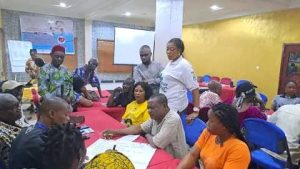Lawrence Nwimo, Awka
Stakeholders in Anambra State have declared their readiness to drive the process of achieving efficient healthcare services in primary health centers in the state.
This was made known during a one-day strategic dialogue session on improving access to maternal and child healthcare service delivery in the state.
The stakeholders comprised leaders and members of the Community Development Network (COMEN), Ward Development Committees, (WDCs) the Joint National Association of Persons with Disabilities (JONAPWD), the Federation of Muslim Women Association of Nigeria (FOMWAN), Small-scale Women Farmers Organization in Nigeria (SWOFON) and other network of partners.

The workshop was one of the series of activities marking the second phase of the Strengthening Public Accountability for Result and Knowledge (SPARK 2) project supported by the International Budget Partnership (IBP) in the state.
IBP SPARK COMEN Consultant, Ugochi Ehiahuruike, said that the objective of the SPARK 2 project in Anambra was to improve maternal and child health service delivery as well as target the overall improvement of primary health centers in the state.
“The session is to discuss the concept of SPARK 2 and System change towards attaining better maternal and child healthcare service delivery with COMEN, WDCs, JONAPWD, and Health Network of Partners to integrate them into the maternal and child health campaign.
“It is also to identify key challenges and bottlenecks in the delivery of healthcare services to mothers, children, and people with disabilities and use information gathered to design inclusive advocacy engagement messages as well as generate innovative solutions and strategies to overcome identified challenges,” Ehiahuruike said.
She also said that the project will help bolster agencies to engage in fiscal governance, facilitate reforms, engender accountability and enablement as well as boost ideas, norms, and discourse.
SPARK Program Manager, JDPC, Nnewi, Onyekachi Ololo, noted that unlike SPARK 1 which focused on three Local Government Areas on water provision in PHCs, the project in the second phase has been expanded to accommodate six LGAs in the state.
“We are now focusing on maternal and child health with a target to cover six LGAs including Idemili South, Awka North, Aguata, Nnewi South, and Ayamelummand Onitsha. Apart from the six selected LGAs, we will be reaching out to other LGAs during implementation,” Ololo said.
In his presentation, the Executive Director of Civil Rights Concern (CRC), Okey Onyeka, harped on the need for adequate healthcare to enable people to function well in the society.
Reminding that WDCs are the bridge between the PHCs and the villagers, Onyeka called for the inclusion of PWDs in the design, planning, and implementation of healthcare programs both at the state and local levels.
He called on the stakeholders to ensure that public facilities in their localities including healthcare centres are made accessible for use by persons with disabilities. He also advocated for the training of healthcare officials on proper care and handling of PWDs.
COMEN Chairman Anambra state, Ide Godwin Eze, charged stakeholders to hold their duty bearers to account and work to ensure that quality and equitable healthcare services are delivered in their localities.
Ikengaonline reports that the brainstorming session featured experience sharing, questions and answers, discussion on best practices, and innovative solutions to pave the way for a more efficient and effective healthcare delivery system.